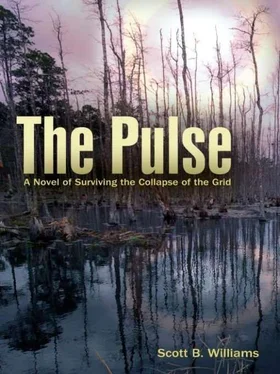Artie knew he had a lot to learn about sailing and navigating, and now it was no longer merely a recreational pursuit. He was determined to absorb everything he could from Scully. Seeing how quickly last night’s attack had rendered his brother incapacitated and could as well have left him dead, Artie realized he had to take responsibility for finding their way and operating the boat on his own, as something could certainly happen to Scully too. From that morning on, he resolved to master the skills of seamanship, and when he came back on deck, he became an eager apprentice, giving Scully his full attention and following his directions just as he would defer to a senior physician explaining a complicated new surgical procedure.
“Dis boat she don’ point so high in de wind and she don’t tack like dem racin’ yacht, but she gonna fly off de wind, mon. Get out on de Atlantic side away from de island few miles, an’ de wind gonna pick up. I t’ink we makin’ 200, mehbe 220 miles a day like dat.”
Once he helped Scully get the sails trimmed to his satisfaction and all the loose ends of the sheets and halyards coiled neatly, Artie ducked into the navigation station in the starboard hull and brought out his brother’s chartbooks for the Greater Antilles and Bahamas. He wanted to study the route while the winds were light, the sun was shining and the Casey Nicole was skimming along the surface of nearly smooth seas almost as steadily as she had rested at anchor. Feeling her sails harness the wind like a great winged bird gliding in the breeze; Artie again marveled at the tremendous amount of work and ingenuity that went into building her. He knew then, if he hadn’t known before, that Larry could have done anything in life he set his mind to, and the skills he had learned in this sea vagabond’s life were as complex and intricate as those required for his own career path. And one thing was certain: such skills and knowledge would be invaluable in the days ahead.
Isleta Palominito faded in their wake as they sailed past the northwestern point of Puerto Rico and the condos and hotels of Fajardo that crowded the beaches and reflected the morning sun from their glass and white stucco facades. Scully was careful to keep their course well offshore here, far enough that they could see no details on the coastline and, presumably, would only be seen as a distant white sail from eyes ashore looking seaward. Scully pointed out on the chart where the reefs and other hazards to mariners were indicated, and explained how to triangulate their approximate position from landmarks ashore by using Larry’s binoculars with the built-in compass to take bearings. While it wasn’t quite as easy as looking at the moving blip that had indicated Ibis ’s position on the electronic chartplotter before the pulse, Artie found that triangulation worked well and would make it possible to measure their progress as long as they were in sight of land. For the hops between islands, they would depend on the dead reckoning method Larry had explained to him during the last leg of their trip into St. Thomas without instruments. Keeping an accurate log was the main thing—that and keeping up with the time and knowing how to judge the boat’s speed through the water—something that Scully assured Artie he was very good at.
That speed increased just as Scully had said it would after ten a.m., when the trade winds freshened to the steady force five that Larry had said could be counted on in these latitudes at this time of year from late morning until well after dark. By now they had rounded the northeast corner of the island and were running before the wind to the west, staying well north of the coastline. Artie was alarmed to hear disconcerting creaks and groans from the mast foot and the connection points of the beams and the hulls as the rig was stressed and the boat surged forward, doubling her cruising speed to more than 12 knots.
“No problem, Doc! Dis boat she happy to get de wind, and not’ing gonna break in dese conditions. She can take a blow lot stronger widout to worry.”
“I just wondered if maybe we should reduce sail a bit, that’s all.”
“You want to go to Bobbylon or sit out on de watah an’ watch de fish? Not to worry ’bout de sail. She runnin’ off de wind, an’ de seas dem not too big. If de Copt’n be on deck right now he put up de spinnaker too!”
“He always was a daredevil. Yeah, I want to get there as fast as possible, but let’s not break something trying.”
“Everyt’ing on dis boat built strong, mon. I an’ I see to dat myself. You brotha, he pick a good design to build, an’ she goin’ take us to New Orlean an’ den anywhere we want to go. Not to worry ’bout de boat no more, Doc. Jus’ enjoy de sailin’ and de freedom to ride de wind across de sea.”
Artie did feel the sense of freedom that held so much attraction for Larry and Scully, but more importantly, at the speed they were now making, he felt a sense of progress . That progress was easily measured without the need to take bearings, by simply watching as the city of San Juan and the rest of the rugged north coast of Puerto Rico slipped past them to the south over the course of the day as the wind bore them west. By late afternoon, the entire island was astern, and well before sunset it had dropped below the horizon in their wake. For the first time since he’d arrived in St. Thomas with Larry, Artie was once again at sea beyond the sight of land. Full darkness fell and the visible horizon closed in to the limits of what could be discerned by starlight. No lights from anything man-made could be seen, though that didn’t mean there were no other vessels sailing in the vicinity. Though they had Larry’s backup LED navigation lights to use if necessary, Scully said it would be best to save the batteries and instead keep a sharp watch, on rotating shifts. With any ship or other vessel they might encounter likely to be unlit as well, sounds would be as important as visual cues to alert them to dangers close enough to worry about.
Larry remained in his bunk through that entire first day and night, in a lot of pain but still wanting regular progress updates whenever Artie or Scully went below to check on him or get something out of the galley. During Scully’s watch, from eight p.m. to midnight, Artie changed the bandage on Larry’s forearm and sat with him, discussing routes and options for the trip.
“We still have no way of knowing how bad it is up there, or even knowing for sure if the grid is down on the mainland. If it is, we don’t know how much else may have changed. I’m worried about even being able to enter U.S. waters.”
“I thought it wouldn’t be an issue since we’re sailing directly from U.S. territorial waters in Puerto Rico to the mainland. As long as we don’t clear in to the Bahamas or anywhere else, we shouldn’t have a problem, right?”
“In normal times, no, but how will they know where we’re coming in from? If there are Navy ships patrolling or blockading the coastlines, they may have orders to intercept any vessel sailing in from international waters.”
“But why would they do that? If this surge or pulse or whatever it was came from the sun, they couldn’t blame some other country for an EMP attack, like Pete was speculating about.”
“No, but you know it’s still going to be an urgent matter of national security up there. You’ve been living there since 9-11; I haven’t. You know how things got right after that, and then again after every minor incident. I know this is going to cause all kinds of security issues, but I have no idea how this may or may not have affected the military’s capabilities. I know that in normal times, it had gotten to where nothing could get in from the islands undetected, even from way back in the ’80s when Reagan cracked down on the cocaine and grass smugglers running goods over from Bimini.”
Читать дальше












